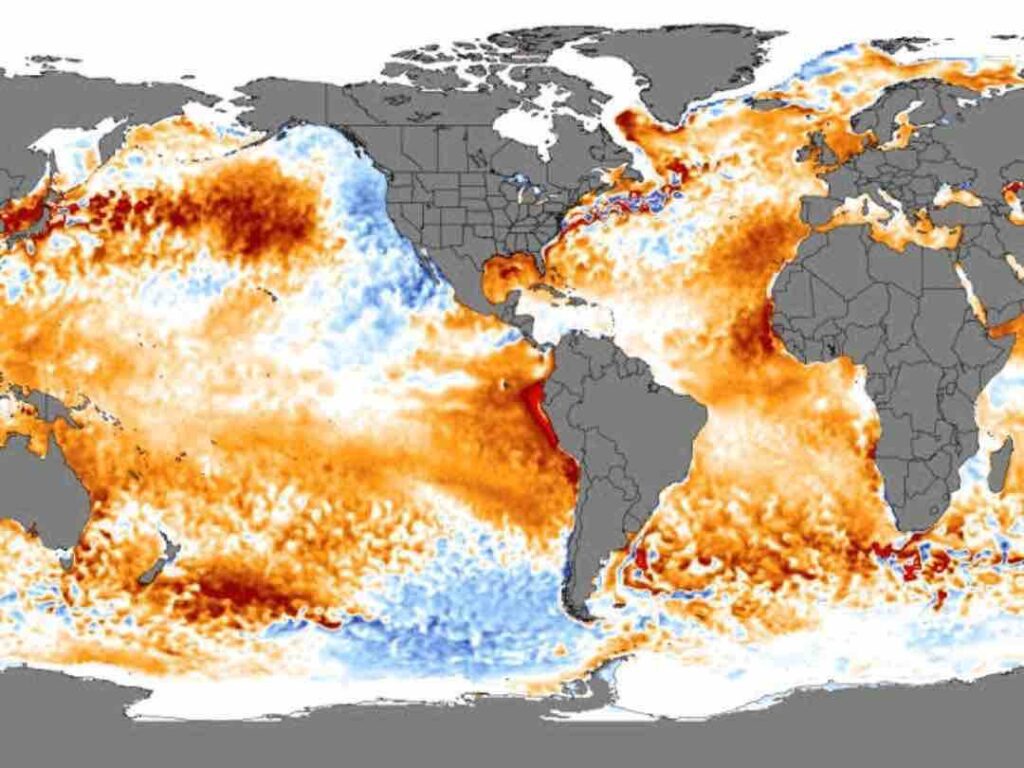Disturbing News: Ocean Surface Hits Highest Recorded Temperature of 20.96°C, marking a disconcerting record high; and Expected to Rise Further.
Beneath the azure expanse of our planet’s seas lies a creeping, disturbing fever. In a world increasingly defined by the bite of its truths rather than the bark of its headlines, this one stings: 2023’s oceans are the hottest ever recorded, sending ripples of concern through the scientific community.
RELEVANT SUSTAINABLE GOALS


A Scorching Sea Surfaces: Red Alert for Planet Earth
Fresh intel from the vanguard of climate data, Copernicus climate modelling service, dropped a chilling bombshell: our global average sea surface temperatures (SST) just tipped the scales at a scorching 20.96°C this week. That’s a smidge above the previous red-alert high of 20.95°C in 2016. But what’s stoking this fiery fever? Look no further than the modern age’s most infamous villain: the climate crisis, turbocharged by our relentless addiction to fossil fuels.
Dr. Samantha Burgess, a heavyweight voice from Copernicus, drops some wisdom on us: the oceans usually turn up the heat in March, not the dog days of August. The culprit? Our old frenemy, the El Niño weather pattern, which was the same bad actor on stage during the 2016 temperature spike. Yet, this isn’t just nature doing its thing. Our carbon footprint is giving these patterns a steroid boost, as our atmosphere groans under the weight of human interference.

Here’s a slice of cold truth in this hot mess: since the neon-soaked 70s, average sea temps have been on an uphill trek, all thanks to the deluge of greenhouse gases we’ve poured into the atmosphere. These gases might as well be throwing a heated blanket over our seas, turning them into a steamy ‘bath’, and supercharging the greenhouse effect, which turns up Earth’s thermostat.
But why the fuss over some warm water? Well, our oceans aren’t just for beach vacations and deep-sea Insta shots. They’re Earth’s buffer, swallowing heat, orchestrating our weather, and guzzling down carbon like it’s going out of style. But as they warm up, their carbon-sipping days are numbered, leading to more of the greenhouse bad stuff in our skies. Not to mention, warmer oceans flirt with our ice caps, sending them melting and hiking up sea levels, putting coastal homes and habitats in the splash zone.
This isn’t just another headline—it’s a clarion call. Over the past century and a half, we’ve turned up the oceanic heat by about 0.9°C, but the past 40 years alone account for a 0.6°C surge. Marine heatwaves aren’t just future sci-fi; they’re here, roasting our marine homes and threatening our shorelines.
It’s time to flip the script. Ditch the fossils, embrace the renewables, and give our blue planet the respect it deserves. The clock’s ticking, and we’ve got a world to save.
Lead image courtesy of Remains from Getty Images.
You may also be interested in :
Revolutionizing Ocean’s Future : Why The UN’s High Seas Treaty Matters



